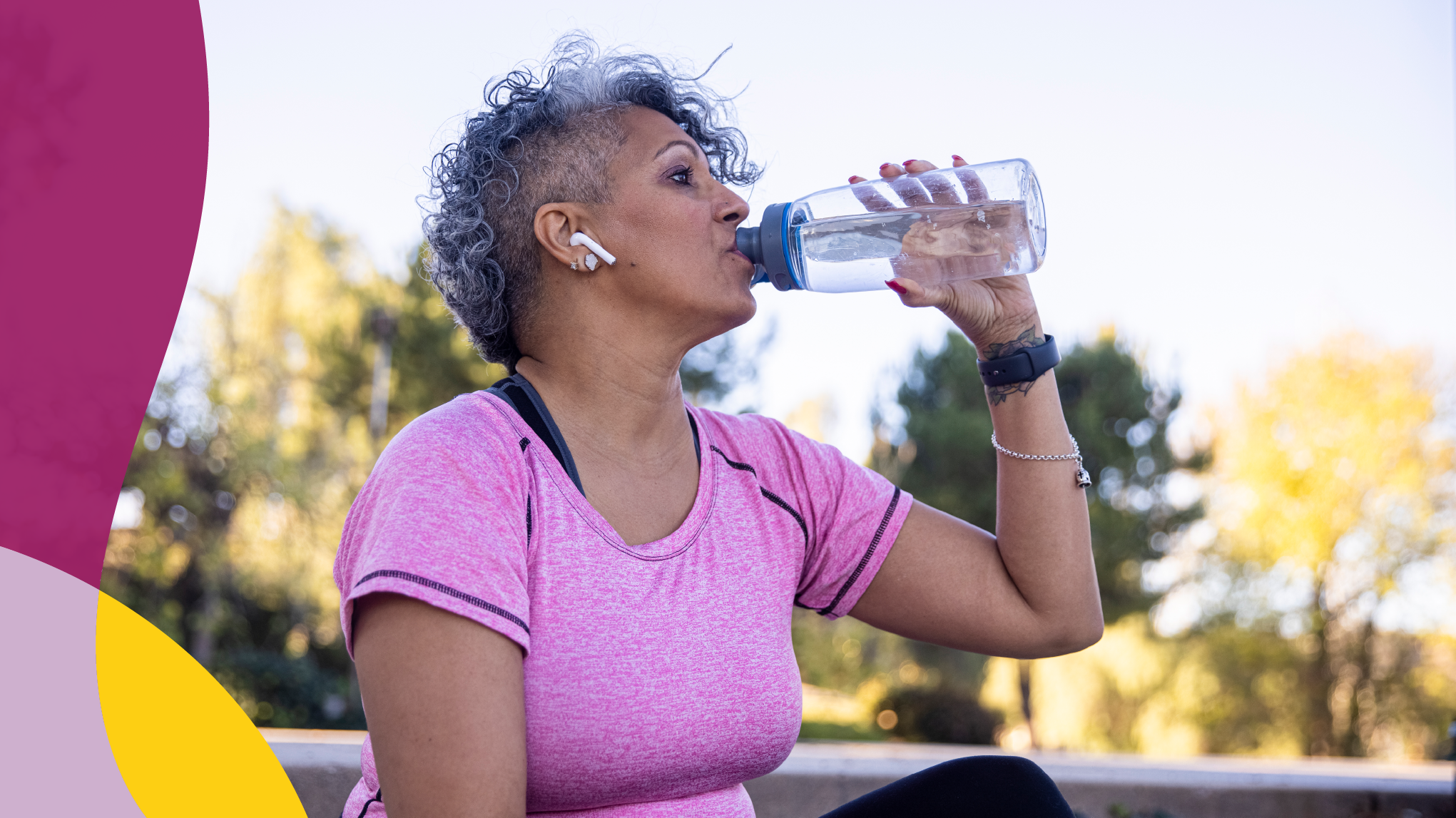
Staying Hydrated During Cancer Care
Staying well hydrated during cancer treatment is extremely important, for both your ability to tolerate treatment and quality of life. About 60% of the body is water, which plays a critical role in many vital functions, including regulating heart rate, blood pressure, and body temperature, as well as transporting nutrients around the body and removing waste and toxins. Staying well hydrated requires taking deliberate steps to take in enough fluid to balance intake with losses over the day.
When you’re fatigued, experiencing nausea, vomiting, diarrhea, or have a fever, staying on top of fluid needs can be challenging. Water may also taste “off,” and your thirst may be diminished, making it easier to drink less than the amount of fluid you need. Making the extra effort to drink enough can also reduce your need for additional IV fluids.
Symptoms of Dehydration
Symptoms can include the following:
Increased thirst
Decreased urine output
Dark yellow or amber-colored urine
Dry skin, mouth, nose, and throat
Increased heart rate
Increased fatigue
Confusion
Fever
Some of these symptoms may be due to other causes, so your symptoms should always be discussed with your clinical team.
Estimating Fluid Needs
On average, at least 8-10 cups of fluid are recommended, though more may be needed to keep you well hydrated. A simple way to estimate your fluid needs for the day is to use this calculation:
30 ml/kg of body weight
To calculate kilograms (kg), divide your weight by 2.2. Then multiply that number by 30milliliters (ml) for a fluid goal of 2100 ml or 9 cups of fluid daily (1 cup = 240 ml). Using this calculation, you can see that different body sizes would need more fluid.
What Counts as Fluid
Any liquids count except for alcohol. Small amounts of caffeinated beverages do count toward your fluid goal. Examples of fluids include the following:
Water
Seltzer
Juice
Sports/electrolyte drinks
Soups
Smoothies
Protein shakes
Ice cream
Italian ice
Popsicles and frozen juice bars
Herbal/fruit teas
Sometimes it’s easier to drink more if there’s a flavor to the liquids you choose. If you don’t like plain water, try a splash of lemon, lime, or other fruit juice. You can also infuse water with sliced fruits, berries, cucumbers, mint, basil, or ginger, and let it sit in the refrigerator for at least 2 hours. After 24 hours, strain the solids from the water and discard them.
Fresh fruits and vegetables can also help you reach your hydration goals since they have a high-water content (averaging 80 – 95% water).
Fluids with Electrolytes
During cancer treatment, you may experience electrolyte loss. Sodium and potassium are examples of electrolytes that can be depleted due to:
Fluid losses
Dehydration
Vomiting
Diarrhea
Decreased oral intake
Medications and treatments (diuretics, antibiotics, chemotherapy drugs, radiation therapy)
The fluid highest in sodium is broth (400 – 800 mg per oz), and the highest in potassium is coconut water (400 – 500 mg per 8 oz).
This chart lists other examples of electrolyte-containing beverages:
Beverage | Serving Size | Sodium (mg) | Potassium (mg) |
|---|---|---|---|
Liquid I.V. Hydration Multiplier | 1 stick | 500 | 370 |
Propel | 20 oz bottle | 270 | 70 |
Nuun Sport Hydration | 1 tablet | 300 | 150 |
Pedialyte Advanced Care Plus | 1 (17 g) packet | 650 | 370 |
Ultima Replenisher | 1 scoop | 55 | 250 |
Make a Plan for Fluids
Plan to stay ahead of your hydration needs:
Start early in the day so you have time to drink 8-10 (8oz) glasses of fluid daily.
Experiment with both cold and hot liquids and frozen forms of fluids so you know how much you’ll need to rely on each to meet your needs.
Check in with how you’re doing with fluids halfway through your day to see if you’re keeping up.
Always keep a bottle of fluids with you and visible as a reminder to drink.
To prevent waking up to urinate overnight, drink most of your fluids before the two hours before you go to bed.
The Iris Care Team is available to support you. Our oncology registered dietitian and licensed nutritionists are here if you would like help meeting your nutritional needs.
This article meets Iris standards for medical accuracy. It has been fact-checked by the Iris Clinical Editorial Board, our team of oncology experts who ensure that the content is evidence based and up to date. The Iris Clinical Editorial Board includes board-certified oncologists and pharmacists, psychologists, advanced practice providers, licensed clinical social workers, oncology-certified nurses, and dietitians.
Copyright © 2026 OncoHealth. All rights reserved. All materials on these pages are the property of OncoHealth. The information and other content on this website are for information purposes only. If you have any questions about your diagnosis or treatment, please seek the advice of your physician or other qualified health care provider(s).
